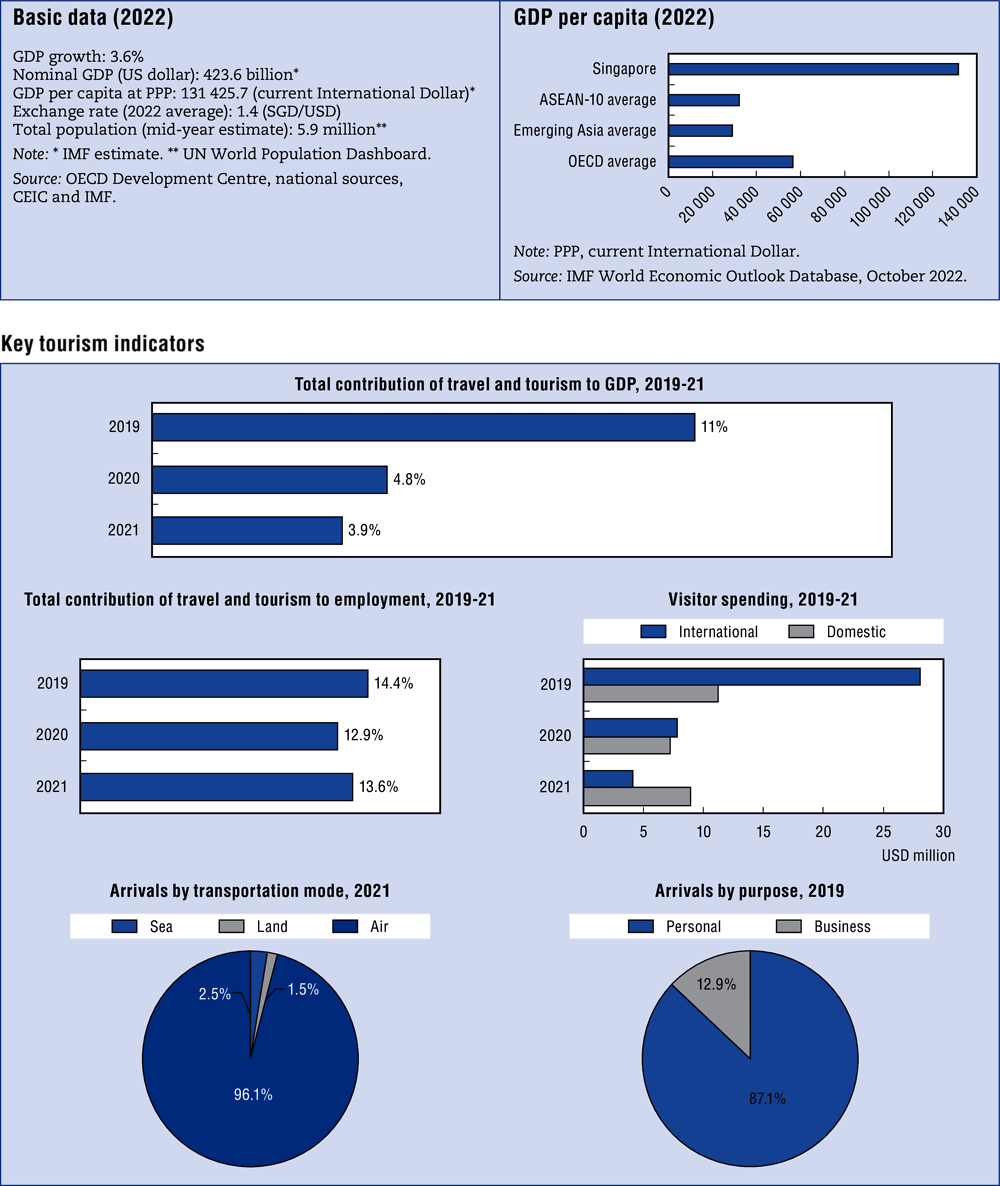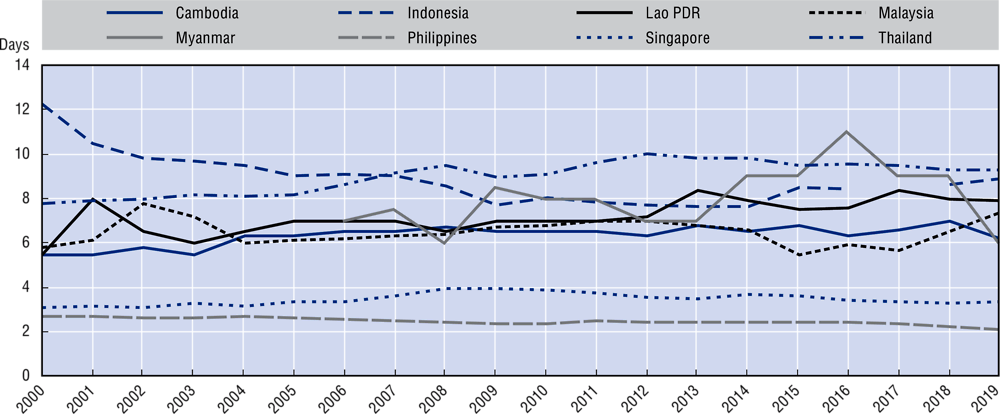Singapore
Introduction
Singapore has made progress steadily in its tourism landscape, building key attractions, and refreshing its tourism products every 5-10 years. After the opening of Marina Bay Sands, Resorts World Sentosa and Universal Studios Singapore, the country launched Gardens by the Bay and National Gallery Singapore in 2012 and 2015 respectively. This was followed by Jewel in 2019, an entertainment and retail complex linked to Changi International Airport. Work is underway for a fifth terminal, and the city-state will soon complete the development of the Mandai Nature Park progressively with the opening of Bird Paradise in 2023. While the country continues to market its multi-faceted appeal as a business and leisure destination, it has also embarked on new growth areas towards being a sustainable urban destination to draw a growing segment of conscious travellers, as well as an urban wellness haven. This country note examines these themes.
Current situation and policy challenges
Quality tourism
Singapore’s pursuit of “quality tourism”, as defined by the Singapore Tourism Board (STB), comprises three key dimensions: i) tourism continues to be an important economic driver for Singapore; ii) tourism development will result in productive and innovative industries and firms that would create employment opportunities for Singaporeans; and iii) sees continuing efforts to nurture public engagement and participation as part of tourism development. To secure quality tourism growth, STB looks to pursue medium term strategies and approaches through a yield driven marketing approach, enhance destination attractiveness, support industry competitiveness, and build local engagement.
Recognising that the strong support and active participation from Singaporeans are imperative to the tourism sector. The SingapoRediscover campaign launched in 2020 by STB, Enterprise Singapore (ESG) and Sentosa Development Corporation (SDC), encouraged Singaporeans and residents to explore different sides of Singapore. The campaign focused on partnering with local communities to help locals discover hidden gems, curating precinct itineraries to create authentic experiences for the locals and collaborating with stakeholders to develop quality experiences and promotions for the locals to enjoy.
MICE tourism
Singapore is well placed as a MICE destination. The country enjoys the reputation as a leading international convention city, according to the International Congress and Convention Association 2021 rankings and has an excellent track record of hosting numerous large-scale and prestigious business events. With the recovery of business events in 2022, Singapore hosted several events, including the Singapore Airshow (13 000 attendees), 60th International Young Lawyers’ Congress (1 200 attendees), World Stroke Congress 2022 (2 200 attendees), Singapore Fintech Festival 2022 (62 000 attendees) and the EY APAC Tax Symposium 2022 (800 attendees). Singapore hosts approximately 4 000 events for more than 400 000 attendees per year (Travel and Tour, 2022), with MICE tourism expected to bring in USD 5.2 billion by 2027 (Research and Markets, 2019). One concern is Singapore’s ability to provide sufficient accommodation for its visitors during popular events (Zalizan, 2022).
To further improve MICE tourism, key stakeholders could consider continuing to seek innovative ideas for hosting global events, market Singapore to global societies and associations as a site for their next annual meeting, package MICE products with leisure tours in Singapore. And to address the challenge of providing sufficient accommodation, a review of property rental laws could be useful to allow shorter-term rentals by local residents during peak event periods via home-sharing platforms like Airbnb.
Manpower and certification programmes
MICE professionals in Singapore have access to professional certifications by Professional Convention Management Association (PCMA) and the Singapore Association of Convention & Exhibition Organisers & Suppliers (SACEOS). Most recently, the PCMA Digital Event Strategist (DES) certification is designed to help business events professionals effectively plan, produce and measure the results of live stream and digital engagement events. This enabled participants who obtained the DES certification to stand out as certified professionals on live stream and virtual events. Furthermore, SACEOS launched the SG SafeEvent Certification in 2021, to provide clear guidelines on safety and hygiene and bring assurance and peace of mind to all event industry professionals. This was in addition to the existing professional development programmes offered by SACEOS such as Professional Conference Management and Professional Exhibition Management.
There are also other existing national trade skills certificate programmes under SkillsFuture Singapore, and full trade-related and degree programmes offered by Singapore’s five polytechnic schools and three universities. The demand for professional certifications presents an opportunity for Singapore to work with its ASEAN counterparts to enhance existing certification programmes and elevate the region’s MICE industry’s competitiveness.
Wellness tourism
The Global Wellness Institute (GWI) defines wellness tourism as travel associated with the pursuit of maintaining or enhancing one’s personal well-being (GWI, n.d.). Despite the COVID-19 pandemic, wellness tourism was an industry worth USD 436 billion in 2020 (GWI, 2021). It is important to note that wellness tourism and medical tourism are distinct, although there may be some overlap. Medical tourism focuses on treatment and recovery, while wellness tourism focuses on health maintenance.
The Singapore Tourism Board (STB) is seeking to leverage on the country’s unique biophilic identity, coupled with its high accessibility, and strength in innovation and technology to position Singapore as an urban wellness haven that is differentiated from other popular Asian destinations. In the domestic tourism market, the STB sought to establish wellness demand and advocacy amongst locals and sustain a robust wellness industry through the Wellness Festival Singapore, an annual multi-site festival of events where locals and visitors can celebrate holistic wellness together with various programmes and initiatives under 3 main pillars (fitness, emotional and mental, lifestyle).
The STB collaborated with global wellness aggregator, ClassPass, to promote businesses in the fitness and wellness subsectors (ClassPass, n.d.). ClassPass offers businesses with greater market reach through platform onboarding, while ClassPass users receive credits in exchange for a monthly subscription fee and can use these credits to access a wide variety of wellness offerings. The global nature of ClassPass means that benefits are not limited to Singapore residents alone and can be promoted to inbound travellers. Other STB-led initiatives will look at integrating wellness with other tourism verticals like MICE, hotels, attractions and tours, etc.
Raising the profile of wellness tourism among short-stay business travellers is a key challenge for the subsector (Figure 5.3). As these travellers often lack familiarity with available offerings, marketing support will be key. Activities that are promoted for these travellers should be shorter in duration, and marketing must clearly demonstrate that the activities add value, given the travellers’ time constraints.
Wellness tourism for domestic and international visitors is the STB’s latest initiative, and the wellness focus is very much on parks and green spaces (Lim, 2022). Further wellness aspects such as spa and massage treatments could prove challenging and make it hard for Singapore to compete with Thailand and other neighbouring countries with advantages in terms of heritage, culture and cost variables. Hence, the STB’s pronouncement of their urban wellness strategy and plans to tap existing strengths as a City in Nature offers a differentiated wellness tourism experience easily catered to any type of traveller (Raguraman, 2022). Singapore’s resilience as a tourist destination can be bolstered by its close work with retailers, attractions, travel agents and hotel associations; innovative live, virtual and hybrid events; and by maintaining a quality workforce; and SingapoReimagine Marketing Programme which supports innovative destination marketing by local businesses.
References
ClassPass (n.d.), “One app for all things fitness wellness & beauty”, https://classpass.com/.
GWI (n.d.), “Wellness tourism”, Global Wellness Institute, https://globalwellnessinstitute.org/what-is-wellness/what-is-wellness-tourism/.
GWI (2021), The Global Wellness Economy: Looking Beyond COVID, Global Wellness Institute, https://globalwellnessinstitute.org/wp-content/uploads/2021/11/GWI-WE-Monitor-2021_final-digital.pdf.
IMF (2022), “World Economic Outlook Database” (accessed October 2022).
Lim, V. (2022), “Nearly S$500 million set aside to support Singapore’s tourism recovery”, Channel News Asia, https://www.channelnewsasia.com/singapore/singapore-tourism-recovery-support-stb-covid-19-singaporeimagine-grants-2610691.
Raguraman, A. (2022), “Wellness will be key component of Singapore’s tourism offerings in next 5 to 10 years: STB chief”, The Straits Times, 3 June 2022, https://www.straitstimes.com/singapore/consumer/wellness-will-be-key-component-of-singapores-tourism-offerings-in-next-5-to-10-years-stb-chief.
Research and Markets (2019), Singapore MICE Tourism Outlook and Projections 2019-2027, www.researchandmarkets.com.
Travel and Tour (2022), “Singapore – A promising MICE destination”, 6 September 2022, https://www.travelandtourworld.com/news/article/singapore-as-mice-destination-is-growing/.
UNWTO (2022), “Global and regional tourism performance” (database), UN World Tourism Organization, https://www.unwto.org/tourism-data/global-and-regional-tourism-performance (accessed on 26 November 2022)
WTTC (2022), “Singapore 2022 Annual Research: key highlights”, https://wttc.org/DesktopModules/MVC/FactSheets/pdf/704/200_20220613170640_Singapore2022_.pdf.
Zalizan, T. (2022), “Singapore F1: Hotels in Marina Bay say rooms are sold out or left with suites for Oct 2 weekend”, Today, https://www.todayonline.com/singapore/singapore-f1-grand-prix-night-race-hotels-marina-bay-rooms-oct-2-weekend-1995366.



